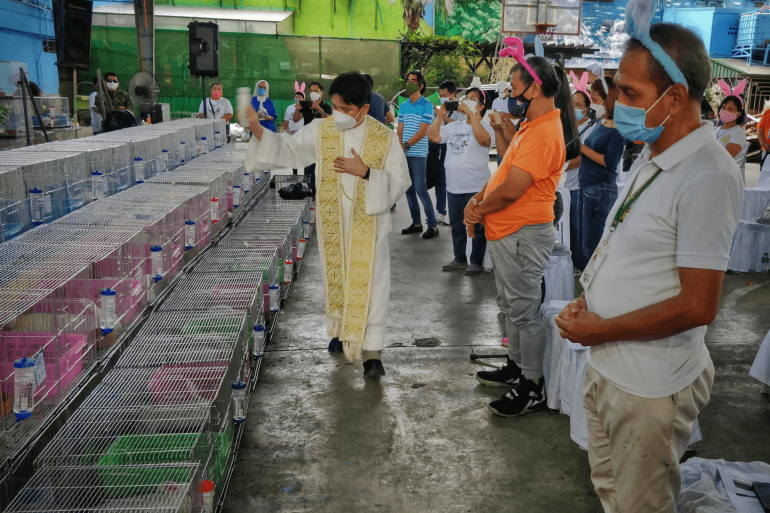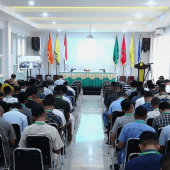Filipino Oblates missionary priest breeds rabbits to feed poor in his parish

An Oblates missionary priest in the Philippines has been breeding rabbits for a year now to feed the poor in his parish in the outskirts of the Philippine capital.
“Rabbit meat is the perfect answer to the problem of hunger,” said Father Eduardo “Ponpon” Vasquez, OMI, pastor of the Shrine of Our Lady of Grace Parish in the Diocese of Kalookan.
He said the idea of breeding rabbits was born while he was working with homeless people in urban poor communities.
“We have to teach them how to produce their own food,” said the priest.
Back in his convent, a friend gifted the priest with a pair of rabbits.
He noticed that the small mammals breed easily. “In just one year, one rabbit can multiply to more than a hundred,” said the priest.
“It’s the perfect response to the problem of hunger,” he said.
On Tuesday, October 26, the Shrine of Our Lady of Grace Parish launched its “Rabbit Dispersal Project” with the support of the city mayor, the congressman of the district, and even the government’s Department of Agriculture.
The parish aims to distribute rabbits to 100,000 poor families in a year.
The recipients will, however, have to undergo a training workshop on how to properly raise and breed the rabbits under the tutelage of the “Father of Rabbitry in the Philippines” (Note: Not Father Vasquez, but Artemio Veneracion Jr., head of the Association of Rabbit Meat Producers in the country.)
Those who will undergo the seminar workshop will receive a rabbit cage, a two-month-old “upgraded breed rabbit,” an “automatic drinker,” two kilograms of pellets, a nest box, and a rabbit raising manual.
‘Lechon rabbit,’ or roasted rabbit, are prepared for dinner during the launch of the ‘Rabbit Dispersal Project’ of the Shrine of Our Lady of Grace Parish in the Diocese of Kalookan on Oct. 26, 2021. (Photo by Vincent Go)
On Tuesday, Father Vasquez roasted rabbits for the visitors during the launch of the project and distributed 75 rabbits to mark the 75th anniversary of the establishment of the Our Lady of Grace Parish.
The visitors partook roasted rabbits during the celebration to show Filipinos that rabbit meat is healthy and more nutritious than the usual meat Filipinos consume.
The all-white meat is lean and low in cholesterol and is rich in highly-quality proteins, omega-3 fatty acids, vitamin B12, and minerals like calcium and potassium.
“It’s also consistent with my urban gardening advocacy,” said Father Vasquez, saying the rabbit manure has four times more nutrients compared to chicken or cow manure.
The priest has been growing vegetables around the parish church for more than a year already “to prove that it is possible to plant vegetables in an urban community.”
The urban gardening project, which he called “Project Grace,” started after the Philippine government imposed a lockdown in the national capital due to the spread of the new coronavirus last year.
“During the lockdown, many poor families I visited complained that they have not enough food to eat or no money because they have lost their livelihood,” said Father Vasquez.
Father Eduardo ‘Ponpon’ Vasquez, OMI, speaks during the launch of the ‘Rabbit Dispersal Project’ of the Shrine of Our Lady of Grace Parish in the Diocese of Kalookan on Oct. 26, 2021. (Photo by Vincent Go)
The priest said he realized that during the pandemic and with the looming economic crisis “people need to go back to the basics and rely on what nature offers to survive.”
With the help of his fellow Oblate priests, Father Vasquez developed a program aimed at helping poor families secure their own food.
The priests uprooted all the “decorative plants” around the parish church compound and replaced it with “plants that can be harvested and eaten.”
In a few months’ time, the priest was able to transform his parish into an urban gardening hub that people visit to learn how to grow their own food in their own homes.
He then raised chicken, and later rabbits, whose droppings are used as fertilizer.
Radio Veritas Asia (RVA), a media platform of the Catholic Church, aims to share Christ. RVA started in 1969 as a continental Catholic radio station to serve Asian countries in their respective local language, thus earning the tag “the Voice of Asian Christianity.” Responding to the emerging context, RVA embraced media platforms to connect with the global Asian audience via its 21 language websites and various social media platforms.











